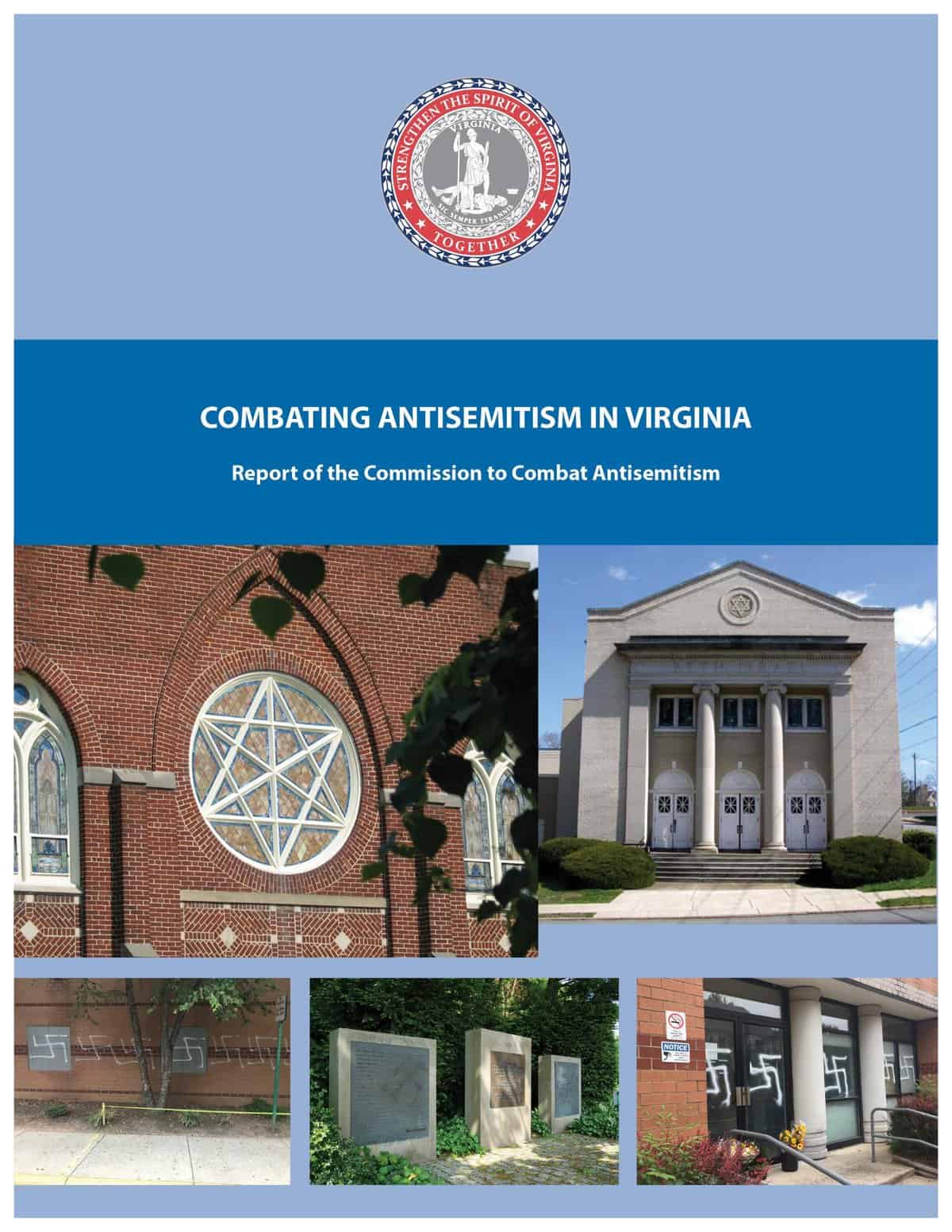Established by Gov. Glenn Youngkin, the Virginia Commission to Combat Antisemitism released its report earlier this month, receiving national, as well as international attention.
On January 15, 2022, his first day in office, the governor signed Executive Order 8, “Establishing the Commission to Combat Antisemitism.” The 15-member commission was convened on May 6 and from Tidewater, included Art Sandler as its vice chair and Connie A. Meyer as a member.
The commission was chaired by Jeffrey Rosen, who served as the acting U.S. Attorney General in the Trump administration’s last month.
The meetings were all open to the public.
“We met five times (in addition to sub-committee meetings) and had a lot of lively discussion,” says Sandler. “There was very little argument—the members were all very smart people.”
Sandler also credits Robin Mancoll, who oversees United Jewish Federation of Tidewater’s Jewish Community Relations Council, with providing the committee valuable data and connections with law enforcement and educators around the state.
“We are glad we were able to contribute to the Commission’s work and look forward to advocating for and helping to implement these important recommendations,” says Betty Ann Levin, UJFT executive vice president/CEO.
In addition to a brief history and overview of the current state of antisemitism, the comprehensive report includes multiple examples of antisemitism that have taken place throughout the Commonwealth, including the fliers left on driveways in Virginia Beach this past summer.
Another example mentioned in the report that has received much coverage is the inclusion of the line, “Even a former president recently met with two notorious antisemites,” referring to former President Donald Trump’s dinner with rapper Kanye West and Nick Fuentes. ADL calls Fuentes a white supremacist.
“One of the members brought up that we should include the dinner as an example,” says Sandler. “We didn’t mention Trump’s name because we didn’t want it to be political.”
The dinner, Sandler notes, shows that antisemitism no longer just lurks in the dark corners of society, but is now mainstream. The committee voted and approved of its inclusion in the report.
The report proposes policy reforms in four specific areas:
1) Definition and Scope of Antisemitism;
2) Educational Responses to Antisemitism;
3) Law Enforcement and Security Responses to Antisemitism; and
4) Trade, Laws, and Legislation to Combat Antisemitism.
Within these four areas, 21 substantive recommendations are outlined.
One of the report’s recommendations is that Virginia adopt the IHRA Working Definition of Antisemitism—including its “contemporary examples.” The uniform definition of antisemtism allows for the accurate collection of data.
Among those commending the report is the Brandeis Center, which announced “its willingness to provide the support that the Commission urges Virginia state officials to seek from the Center and other organizations.”
Under education, the report suggests that Virginia: expand Holocaust Standards of Learning; include Study of Judaism in World History (including the establishment of the modern state of Israel and its impact geographically and globally on the region and the world); increase educator access to antisemitism non-profits and materials; ban academic boycotts (so that no institution funded by the commonwealth or any of its localities could boycott a foreign country not on a terrorist list); advance the study of antisemitism and the law; prohibit indoctrination in public education (to avoid the politicization of history and the present); and require recognition of religious holidays in K-12 education (so that no student is penalized for missing school for a religious holiday), among others.
Under Law Enforcement, the commission recommends that Virginia State Police and local police departments encourage proactive policing during religious holy days, and that police departments educate and train their staff for incidents; expand hate crime training; and support youth initiatives to mitigate radicalization.
Considering antidiscrimination protections, the report recommends that Virginia adopt a law that would bar public entities from following the positions of the Boycott, Divestment, and Sanctions (BDS) hate movement. Other states have passed such laws.
“In my humble opinion, it (the report) is excellent and exhaustive in its depth and breadth; even if only some of the suggestions are adopted, it will make an enormous difference in the lives of Jews in Virginia for generations to come,” said Rabbi Rosalin Mandelberg in her sermon at Ohef Sholom Temple on the Shabbat following the report’s release.
The Commission had one assignment —to develop the report—which is complete. “Now, it’s up to the Governor to decide what to do,” says Sandler. “A report doesn’t do a thing if the political leadership doesn’t enact it.”
Still, Sandler says he “strongly believes that the Governor and Executive Branch is very serious about the report and will take to heart the recommendations and will implement as many as possible.”
–Terri Denison

